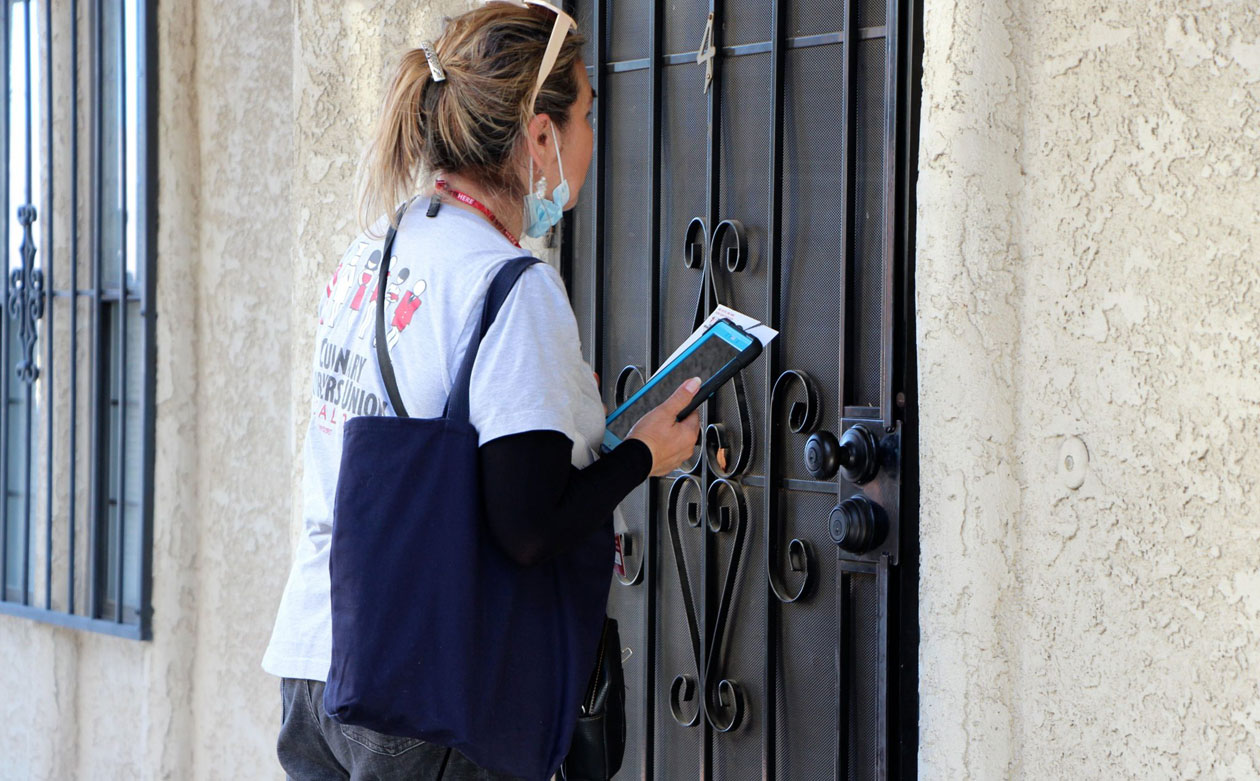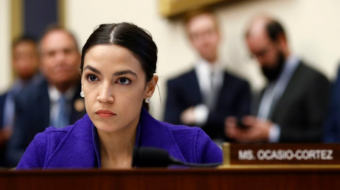
WASHINGTON—It should seem obvious in retrospect—to everyone but the punditocracy and the corporate class—that unions played a key role in pulling out voters committed to the constitutional right to abortion and the need to protect U.S. democracy. They were key in bringing women, youth, and workers to the polls on Nov. 8, giving progressives and Democrats the boost to so many victories in the 2022 off-year election.
Unionists cited those issues as they knocked on tens of thousands of doors in all the key states targeted by right-wing MAGA Republicans. Union leaders poured money into television and radio campaigns and sponsored on-the-job efforts to mobilize workers like never before for a midterm election.
The evidence of the voter uprising fueled by support from labor and its allies was all around, but the pundits, pollsters, D.C. insiders such as campaign operatives and the corporate class either didn’t see it or intentionally tried to tamp it down in hopes it would go away. Instead, those elitists kept trumpeting what they confidently felt would be a self-fulfilling prophecy: That Republican harping on Joe Biden’s poll ratings, rising gas prices, and “higher crime,” with accompanying anti-crime dog whistles and racist repression, were the paths to victory.
Without being prompted voters in classic swing state Pennsylvania were telling Unite Here and Steelworker canvassers, both in rural areas and in center city Philadelphia that the Jan. 6, 2021, Trumpite invasion, insurrection, and coup d’etat attempt at the U.S. Capitol represented a threat to democracy they couldn’t ignore. And they were saying so as early as March before providing the proof at the polls this fall.
The threat really became manifest in late June when the Republican right-wing majority on the U.S. Supreme Court eliminated the constitutional right to abortion—and when the leader of that majority, Justice Clarence Thomas, suggested in his concurring opinion that other rights, to contraception, to same-sex marriage, and to all LGBTQ people, should go on the chopping block, too.
By the hundreds of thousands, women and their supporters, union and non-union, in particular, poured into the streets after that 5-4 vote—and they made the connection between the High Court’s Republican justices and the Republican presidents and Senate majorities which put those jurists there.
Unionists got it, breaking 57%-42% for progressive and Democratic candidates. Young people got it, in a record off-year turnout that rivaled that of their prior peak in 2018, and they, too, gave progressives and Democratic hopefuls large margins. Women, needless to say, really got it. So did union leaders.
A movement forms
“The movement of working people who are joining together in ever-increasing numbers to improve their lives and the lives of their co-workers by organizing unions is transforming our country. We won’t let greedy CEOs and corporate-backed politicians slow our momentum. The middle class is the heart of our democracy, and we will fight every day to strengthen the middle class and win a voice at work and the respect we deserve,” the Communications Workers vowed.
“In a year when democracy, freedom, public education, public safety, and economic security were on the ballot, voters overwhelmingly rejected MAGA extremism and fear,” declared Teachers (AFT) President Randi Weingarten.
“They stood up for democracy and against election deniers. They stood up for the right of women to make decisions about their reproductive health, and against chaos and hate.
“Our country remains deeply divided—and there were many heartbreaking losses. But voters in so many close races elected problem solvers rather than problem makers.”
“Working people and voters of color turned out and made the difference in defying expectations in this midterm election, overcoming historic odds to elect pro-worker leaders in key local, state, and federal races,” Service Employees President Mary Kay Henry’s statement said. “Workers’ votes represent a collective demand that can’t be ignored.
“SEIU members and our allies made significant contributions to these victories, reaching more than five million voters during this election cycle, especially Black, Latinx, Asian American Pacific Islander, and Indigenous voters. We focused our biggest midterm field program in our union’s history on these voters, making a nine-figure investment.”
Among the Senate Democrats that the Republicans tried hardest to defeat, Nevadan Catherine Cortez-Masto, its first Latina, and Arizona’s Mark Kelly, both won in purple states, in large part due to an enormous GOTV effort by Unite Here. The union’s 50,000-member Local 226 in Nevada is the largest in Unite Here and the state.
“More than 1,200 ordinary people–housekeepers, cooks, dishwashers, and other hospitality workers who powered Unite Here‘s canvass–achieved something extraordinary in this election season,” said union President D. Taylor and Secretary-Treasurer Gwen Mills. “In total, Unite Here knocked on 2.7 million doors in Arizona, Nevada, and Pennsylvania to deliver landmark victories for working people in the Senate in all three battleground states.”
“We did this hard work with the support of our union allies to defeat Trump Republicans and back candidates ready to help working people get through these tough times. In the end, we defied expectations in some of the most difficult and high-stakes elections our Union has ever faced.”
Unite Here’s capital “U” in the word “union” could just as easily have stood for the nation’s democratic Union as it could have for the labor union whose leader uttered it.
They’re going to continue on to Georgia, too, from now through Dec. 6, just like Unite Here did two years ago for the U.S. Senate runoffs. The aim: To use those issues to create a win for 2-year Democratic incumbent Sen. Raphael Warnock (D) against scandal-scarred abortion hypocrite Republican Herschel Walker, a former football star anointed by Donald Trump, the insurrection’s instigator and marshal.
But even with the unpredicted wins for progressives and workers, there are still the “problem makers” Weingarten mentioned, otherwise known as Republicans.
Republicans could take the House
The first problem is the probability that Republicans, in thrall to their huge and growing contingent of election liars and democracy deniers, will take over the U.S. House, however narrowly. Minority Leader Kevin McCarthy, R-Calif.—a man whom California Democratic colleague Adam Schiff flatly says cannot be trusted—has already started his campaign for the top job as Speaker. Both parties carried out orientations for members-elect and scheduled leadership elections this week.
The enhanced mob of Trumpites among House Republicans include some who are leery of McCarthy, because they believe he didn’t genuflect enough to Trump. With only a single-digit House majority, students of U.S. politics forecast he’ll find the legislative going tough.
For workers, a second problem is Rep, Virginia Foxx, R-N.C., who has in the past openly declared unions should be outlawed. She’s scheduled to take over the House Education and Labor Committee again—which the GOP will undoubtedly again rename the “Education and the Workforce” committee.
On the other side of Capitol Hill, there’s yet another problem, the Senate filibuster.
Democrats now will have an outright majority: 49 Democrats plus two pro-Democratic independents versus 48 or 49 Republicans, depending on Georgia’s outcome. Fifty-one votes are enough to break through blockades to debate Minority Leader Mitch McConnell, R-Ky., effectively manipulates at the behest of the corporate class.
Debate is one facet. Except for “reconciliation” money bills and confirmation of judges and executive branch officials, you still need 60 votes to halt filibusters themselves. There aren’t 60 votes for that.
There may not be enough votes to eliminate the filibuster. You need 51. Democratic renegades on major legislation, Sens. Joe Manchin (W. Va.) and Kyrsten Sinema (Ariz.) are pro-filibuster, too. That, in essence, is how Manchin killed the Protect The Right To Organize (PRO) Act in the current Senate.
Manchin pledged his support for the legislation, which the Mine Workers, still one of the most influential unions in West Virginia, hailed. But in the same statement, Manchin reiterated his support for the filibuster.
McConnell, like Manchin acting in the interests of the corporate class, killed the PRO Act, by using a filibuster threat to prevent even debate on it.
If Warnock wins, there would be 50 Democrats and two independents, lessening the renegades’ clout.
All this shouldn’t obscure the meaning of workers’ wins on Election Day. Union leaders cheered the results, but several warned the fight isn’t over. “Our work doesn’t stop,” the Communications Workers said. The results “clearly show CWA and other union members’ grassroots efforts helped working people defy the odds and elect pro-worker candidates.” Among those results:
- “In Michigan, Governor Gretchen Whitmer won reelection, beating a right-wing election denier. Democrats in Michigan also won control of the state legislature. This gives us an opportunity to grow worker power in the state by, for instance, fighting back against the state’s so-called “right-to-work” law. we passed a constitutional amendment to protect voting rights and stop corporate interests from overturning the will of the people,” CWA’s statement elaborated.
- Union-backed incumbent governors also won re-election in Illinois—along with a heavily pro-union legislature–Kansas, Minnesota (union member Tim Walz), New York, Wisconsin, Pennsylvania, Connecticut, Rhode Island, New Mexico, and California. The Golden State’s heavily pro-worker state legislature remains intact.
Helped boost Hochul
New York State United Teachers President Andy Pallotta said his union—a joint NEA-AFT affiliate—helped boost New York’s Gov. Kathy Hochul to victory in the closest gubernatorial election in the Empire State in 28 years. Newsday, the influential Long Island paper, credited unions for her 5-percentage-point win. Hochul was the first gubernatorial nominee NYSUT increased since 2006 after she pushed a 7% increase in state aid for local schools through the legislature.
“NYSUT members made 127,412 phone calls, sent out 338,904 texts, and knocked on “thousands” of doors in concert with the AFL-CIO. The statewide union also sent out 236,087 mail pieces and published a stand-alone voter guide.
“Hochul is a proven champion for public school students, educators, and families — from pre-K through post-grad — and her win will ensure that educators have an ally in the Capitol who will continue to stand up for the resources, staffing, programs and policies that NYSUT members need to deliver for New Yorkers,” explained Pallotta.
- Illinois passed the Workers’ Rights Amendment to its constitution, “which adds the fundamental right to organize and bargain collectively to the state constitution while forbidding any law that interferes with that ability,” CWA said.
“Congratulations to all the working people of Illinois for passing the @ILWorkersRights Amendment,” Chicago Federation of Labor President Robert Reiter tweeted. “Together, we passed an amendment into our Constitution that makes Illinois the state with the strongest labor protections in the entire country.”
“History was made with the passage of the Workers’ Rights Amendment,” celebrated Illinois AFL-CIO President Tim Drea of UFCW said in a statement. “This would not have been possible without the strong solidarity of a statewide labor movement that came together in unison n to protect the rights of our hardworking families.”
- Union-backed candidates running for open gubernatorial seats triumphed in Oregon (Tina Kotek), Massachusetts(Maura Healey), and Maryland (Wes Moore). The last two states flipped from Republican control. In Minnesota, pro-worker DFL forces flipped the state House to workers’ advocates control, removing the sole Republican blockade to pro-worker measures.
Gubernatorial races in Arizona and Nevada split: A win for Democrat Katie Hobbs in Arizona and a narrow defeat of pro-worker Gov. Steve Sisolak in Nevada by Trumpite Republican Joe Lombardo. Workers suffered disappointments in the Florida and Georgia gubernatorial races and the Florida, Ohio, and North Carolina U.S. Senate seats.
News reports indicated the D.C.-based Democratic “establishment” of pundits, pollsters, and campaign operatives were lukewarm, or worse, to three prominent Black women seeking those high offices: Cherie Beasley (N.C. Senate), Rep. Val Demings (Fla. Senate) and Tracey Abrams (Ga. Governor). That’s even though Black voters—and especially Black women—are progressives’ and Democrats’ most-dependable voters.
In Ohio’s U.S. Senate race, right-wing billionaire Peter Thiel bought a U.S. Senate seat, with millions of his dollars boosting Republican election liar/denier and novelist J.D. Vance over pro-worker Rep. Tim Ryan (D). But Thiel’s cash couldn’t buy an Arizona U.S. Senate seat, where 2-year incumbent Mark Kelly (D), seeking a full term, beat Republican election liar/denier Blake Masters, 52%-47%.












Comments